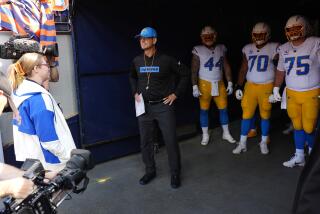It’s Cutdown Day : In Business of Pro Football, Careers Are All Too Short, Tomorrow Quickly Becomes Yesterday and Then Goodby
WASHINGTON — Every team in the NFL must now pare its roster to 45, to identify and hack off the dead wood. Cutdown days don’t sneak up unnoticed. Every coach is aware of them. So is every player. Cutdown days are a ritual in professional team sports, a sweet and sour ceremony that publicly beheads some and at the same time celebrates others: Nelms goes; Moseley stays.
Each year, on the days following the big cutdowns, you’ll read stories about seemingly able-bodied young men who suddenly find themselves out of work, having been informed that their skills, eroded as they have become no longer considered useful. These stories invariably are accompanied by much gnashing of teeth and wringing of hands by the management that made the judgment:
“This is the toughest part of the job. But we really do feel like we’re still a family here.”
Most coaches sincerely believe that. Most players don’t.
Coaches, overwhelmingly former players themselves, want to instill the concept of family because the inherent symbolism tends to foster a selfless, collective spirit.
But players are labor, and labor looks at management skeptically. While management says that cutting so-and-so was the toughest thing it ever had to do, the player notes that the organization, acting in its own self-interest, still did it.
If we’re family, how could they?
If they did it to so-and-so, why wouldn’t they do it to me?
Cutdown day reinforces a coach’s compassion.
Cutdown day reawakens a player’s fear.
Cutdown day upsets coaches.
Cutdown day terrifies players. When was the last time you saw a player cut a coach?
If you’re looking for a symbol of why the modern professional athlete seems to care more about the money than the game, look no further than cutdown day.
The average NFL salary is $160,000 a year. That’s a lot of money.
But the average NFL career lasts 4.5 years, and that’s not a long time.
Like most if not all professional athletes, the NFL player has concentrated primarily on preparing his body, rather than his mind, for his profession. There undoubtedly is a mental component to professional sports, but it’s not anything a scout can time in the 40. The player has just so much time to get better than his competitors. Given the choice he invariably, and quite correctly, picks the weight room over the library.
The player always knows that somewhere there’s a management man getting ready to cut him. The player always knows that there is a person standing between him and just one more night, please give me one more night, in this profession he loves. And damn, but management is so fickle. All it takes to turn its head is a pair of young legs. Yo, Pops, what have you done for me lately? Yeah, see you around campus.
What’s the long view in sports?
For a general manager, maybe it’s five years.
For a coach, maybe three.
For a player, tomorrow.
And when it ends, when the coach looks you in the eye and tells you this is just killing him, but you’re history, son, when management puts your name on the press release and hands it to the reporters so the whole world knows they’ve asked for waivers on you for the purpose of giving you your unconditional release, because you’re no good to them anymore, they can’t use you, when all that happens, then what?
Okay, it’s not unfair. It’s a business, and you accept that. But then the short-term humiliation gives way to the long-term, and potentially torturous readjustment to an adult society you’ve never had to function in. Once a chief, you have to be one of the Indians now. Since you’re not at all eager about your new role, your first impulse is to withdraw.
But how far can you drive your fancy cars?
How long can you sit in your fancy condominium?
You’re a young man. The bills aren’t going to stop coming just because they took away your uniform. What are you going to do with your life?
There are two lessons an athlete ought to take away from cutdown day:
One, it always comes sooner than you want.
Two, as long as it’s one big, happy family, ask them for a loan.
More to Read
Go beyond the scoreboard
Get the latest on L.A.'s teams in the daily Sports Report newsletter.
You may occasionally receive promotional content from the Los Angeles Times.










